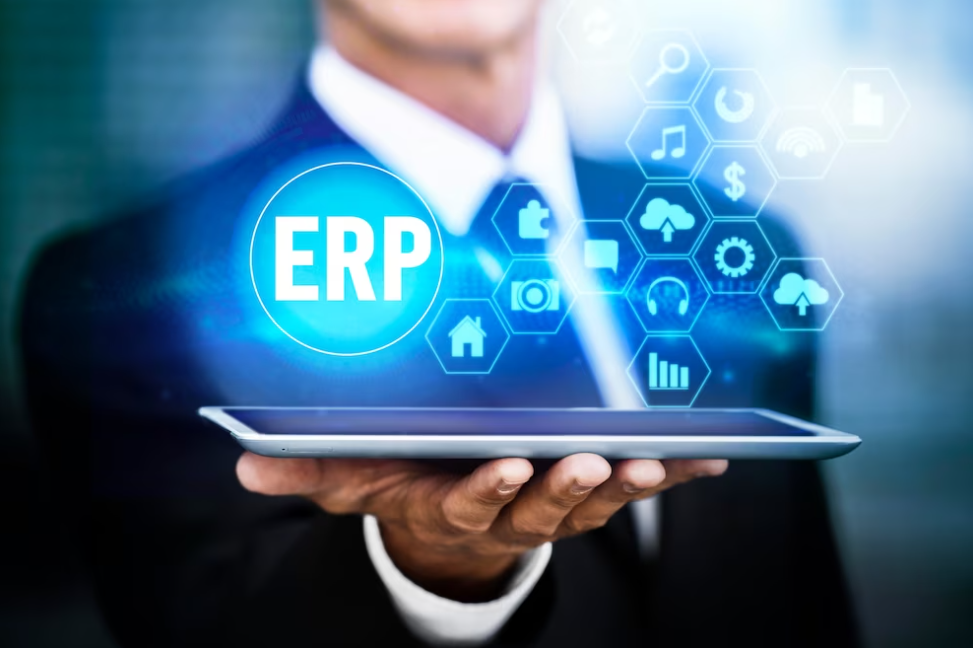
The Future of ERP (Enterprise Resource Planning): Transforming Industries with Integrated Solutions.
Table of Contents:
- Introduction to ERP(Enterprise Resource Planning).
- The Evolution of ERP (Enterprise Resource Planning).
- Key Trends Shaping the Future of ERP(Enterprise Resource Planning)
Introduction to ERP (Enterprise Resource Planning):
Enterprise Resource Planning (ERP) systems have evolved significantly over the years, becoming a cornerstone of efficiency and innovation for businesses across various industries. As we delve into the future, the role of ERP is set to expand, bringing about transformative changes in how organizations operate and streamline their processes.
The Evolution of ERP (Enterprise Resource Planning):
Initially designed to manage core business processes such as finance, human resources, and supply chain, ERP systems have undergone a remarkable transformation. Modern ERP solutions integrate advanced technologies like artificial intelligence, machine learning, and data analytics, offering organizations a comprehensive platform for data-driven decision-making.
Key Trends Shaping the Future of ERP (Enterprise Resource Planning):
Cloud-Based Solutions:
The future of ERP lies in the cloud. Cloud-based ERP systems provide greater flexibility, scalability, and accessibility, allowing businesses to adapt quickly to changing market conditions.
AI and Machine Learning Integration:
ERP systems are increasingly leveraging AI and machine learning to automate routine tasks, enhance predictive analytics, and provide valuable insights for strategic decision-making.
Mobile ERP:
With the rise of remote work, mobile ERP applications enable employees to access real-time data and perform tasks from anywhere, fostering greater collaboration and agility.
Blockchain for Data Security:
The implementation of blockchain technology enhances data security, integrity, and transparency within ERP systems, addressing concerns related to privacy and fraud.
IoT Integration:
The Internet of Things (IoT) is playing a pivotal role in ERP by connecting devices and systems, optimizing supply chains, and enabling better monitoring of assets and processes.
Top Industries that Use ERP Software’s
ERP in Manufacturing Industries:
ERP streamlines production processes, inventory management, and supply chain operations, ensuring optimal efficiency and cost-effectiveness.
ERP in Healthcare Industries:
In the healthcare sector, ERP systems facilitate better patient management, inventory tracking, and compliance with regulatory requirements.
ERP in Retail Industries:
Retailers utilize ERP to manage inventory, streamline sales processes, and enhance customer experiences through data-driven insights.
ERP in Finance Industries:
ERP solutions in the financial industry automate accounting, financial reporting, and compliance, reducing manual errors and improving overall financial management.
ERP in Education Industries:
Educational institutions leverage ERP for student information management, academic planning, and resource optimization.
ERP in Construction Industries:
ERP systems in the construction industry aid project management, resource allocation, and collaboration among diverse teams.
Here is a list of well-known ERP software:
SAP ERP:
A widely-used enterprise software suite covering various business processes.
Oracle ERP Cloud:
Offers a comprehensive suite of applications for finance, procurement, and project management.
Microsoft Dynamics 365:
Integrates ERP and CRM capabilities for businesses of all sizes.
NetSuite:
A cloud-based ERP solution that includes modules for financials, CRM, and e-commerce.
Infor ERP:
Provides industry-specific ERP solutions for sectors such as manufacturing, healthcare, and retail.
Epicor ERP:
Tailored for industries like manufacturing, distribution, retail, and services.
Workday:
Primarily known for its cloud-based solutions for finance and HR.
Acumatica:
Cloud-based ERP solution with a focus on flexibility and scalability.
IFS Applications:
Offers ERP solutions for industries like aerospace, defense, manufacturing, and more.
SYSPRO:
Specializes in ERP solutions for manufacturing and distribution.
Odoo:
Open-source ERP with modules for various business needs
Intacct (now Sage Intacct):
A cloud-based financial management and accounting solution.
QAD ERP:
Focused on manufacturing ERP solutions for automotive, industrial, and consumer products.
JD Edwards EnterpriseOne:
Oracle’s ERP solution for large enterprises.
Ramco ERP:
Provides cloud and on-premise solutions with a focus on artificial intelligence and machine learning.
Deskera:
Cloud-based ERP with modules for finance, HR, and CRM.
Sage X3:
A comprehensive ERP solution for mid-sized businesses
Openbravo:
Open-source ERP solution with a modular approach.
Sage 100cloud:
Tailored for small to medium-sized businesses
Epic ERP:
Designed for small and medium-sized businesses across various industries.
Before selecting an ERP solution, it’s crucial to assess your specific business requirements, industry needs, and budget constraints. Additionally, check for the most recent reviews, updates, and features of the software you’re considering, as the ERP landscape is dynamic and continuously evolving.
Conclusion:
As we look to the future, ERP systems are poised to play a central role in fostering innovation, efficiency, and competitiveness across industries. The continuous integration of emerging technologies ensures that ERP remains a dynamic and indispensable tool for organizations striving to navigate the complexities of the modern business landscape. As industries evolve, the role of ERP will only become more integral in driving success and facilitating growth.







